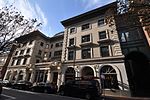Harvard station

Harvard station is a rapid transit and bus transfer station in Cambridge, Massachusetts. Located at Harvard Square, it serves the MBTA's Red Line subway system as well as MBTA buses. Harvard averaged 18,528 entries each weekday in FY2019, making it the third-busiest MBTA station after Downtown Crossing and South Station. Five of the fifteen key MBTA bus routes stop at the station. Harvard station is located directly beneath Harvard Square, a transportation, business, and cultural focal point in Cambridge. The Red Line rail platforms lie underneath Massachusetts Avenue just north of the center of the square. Many connecting surface transit routes are served by the Harvard bus tunnel, which runs on the west side of the station. The primary station entrance leads to a central atrium fare lobby under Harvard Square; there is also a secondary fare lobby for the Red Line toward the north end of the station, with entrances at Church Street and opposite it, near Harvard's Johnston Gate; and an unpaid entrance to the bus tunnel at Brattle Square.
Excerpt from the Wikipedia article Harvard station (License: CC BY-SA 3.0, Authors, Images).Harvard station
Massachusetts Avenue, Cambridge
Geographical coordinates (GPS) Address Nearby Places Show on map
Geographical coordinates (GPS)
| Latitude | Longitude |
|---|---|
| N 42.3734 ° | E -71.1193 ° |
Address
CVS Pharmacy
Massachusetts Avenue
02163 Cambridge
Massachusetts, United States
Open on Google Maps









